Showing 1-17 of 17 results

The Performance of Cover Crops in Minimally Tilled Forage-based Grazing Systems
In a Southern SARE-funded Graduate Student Grant (GS15-152), “Evaluation of Winter Annual Cover Crops Under Multiple Residue Management: Impacts on land management, soil water depletion, and cash crop productivity,” Texas Tech University researchers investigated five cover crops species as potential complements to a warm-season beef-stocker grazing system. The impact of the project was two-fold: Stabilize the soil surface from excessive wind erosion and desiccation; and strengthen rural communities by ensuring the persistence of profitable agriculture in the region.
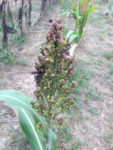
Innovations in Large-Scale Trap Cropping for Reducing Insect Pests
Trap cropping is a unique pest prevention system that uses insect behavior to deter pest feeding. Benefits of trap cropping not only include effective pest management, but trap crops can also increase biodiversity, conserve natural enemies and reduce wind damage to main crops.
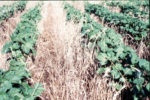
Economics of Cover Crops I: Profitability of Cover Crops in Row Crop Production and Federal Cost Share for Cover Crops
Many agronomic benefits of covers are also economic benefits. But there are real and perceived agronomic and economic challenges to adopting cover crops. Researchers at the USDA-ARS, National Soil Dynamics Laboratory (NSDL) in Auburn, Alabama and at the University of Georgia—Tifton have past and current research that addresses the challenges faced by producers.

Cover Crop Establishment and Residue Management
Benefits associated with cover crops that may include erosion control, increased organic matter, increased water infiltration, and weed suppression are all typically enhanced as biomass levels increase. In order to ensure adequate levels of biomass, growers should recognize the importance of cover crop establishment.

Cover Crops and Soil Biology: What Do We Know?
Investigating soil biology is a wild, unpredictable zoological ride. From the smallest organisms on Earth (viruses) to earthworms, cover crop selection and management is affected by and influences soil biology in ways we cannot completely predict.

Evaluating Nutrient, Soil Health, and Economic Benefits of Compost Additions to Summer Cover Crops for Strawberries in North Carolina
Over the past 8 years, a team of multidisciplinary faculty and students at NC State University have conducted various field-based studies at the Center for Environmental Farming Systems (CEFS) and on-farm research examining the impact of summer cover crops, compost additions and applications of beneficial arbuscular mycorrhizal fungi and vermicompost on soil health, nutrient availability, and yields in conventional and organic strawberry production systems.
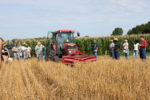
Equipment Demonstration and Conservation Systems Overview
Conservation tillage combined with high residue cover crops (Conservation Systems) can maximize residue production and minimize residue decomposition to promote the increase in organic matter across degraded soils of the Southeast, despite climatic conditions.

Perennial Grass Cover Crops Can Optimize Wine Grape Growth
Vineyard cover crops or ‘living mulch’ consists of either sown or native vegetation, grown in vineyard row middles and/or inclusive of the area under the vine trellis (Fig. 1). Although cover crops can increase pest pressure (arthropods and voles) and vineyard management costs, benefits of cover crops include: erosion and weed control, reduction of herbicide use and mitigation of excessive vine vigor.
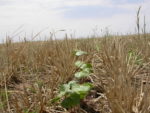
Economics of Cover Crops II (Part 1): USDA-NRCS Cover Crop Economics Decision Support Tool
Developed by USDA-Natural Resources Conservation Service (NRCS) economists, Lauren Cartwright (Missouri) and Bryon Kirwan (Illinois), The Cover Crop Economic Decision Support Tool is designed to help producers, landowners, planners, and others make informed decisions when considering adding cover crops to their production systems.
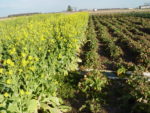
Cover Crops for Weed Management in Row Crops
The use of cover crops for weed control can help conventional producers combat herbicide-resistant weeds and organic producers reduce dependency on cultivation as their primary weed control mechanism.
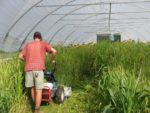
Soil Management Using Cover Crops in Organically Managed High Tunnels
In southern climates, high tunnels are typically used for season extension in the spring, fall, and winter. In the hot summer months, if no shade cloth is used to cover high tunnels, it can be difficult to grow anything but the most heat tolerant crops, and it can be uncomfortable to work in tunnels due to the heat. This is an excellent time to incorporate a cover crop, between the late spring and early fall crops. Many cover crops species are adapted to hot southern summers and perform well in high tunnels.
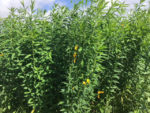
Economics of Cover Crops II (Part 2): Benefits of Cover Crops and No-Till Vegetable Production in North Alabama
While the benefits of cover crops are similar regardless of cash crop, there are a number of benefits that are particularly important to vegetable producers. The main benefits of cover crops in vegetable production include increased organic matter; additional N through the use of legumes; suppressing disease, nematodes, and weeds; reducing soil erosion; providing habitat for beneficial insects; and improving soil tilth.
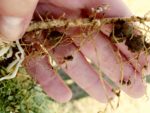
Nitrogen Release from Cover Crops
Nutrient management is a timely agricultural topic that boils down to determining the right rate, source, timing, and placement of nutrients. Cover crops can greatly influence nitrogen management either by providing available nitrogen for cash crops or by immobilizing nitrogen and creating the need for greater nitrogen fertilizer for cash crops.
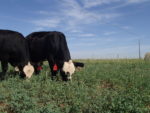
Introducing Annuals in Grazed Pastures
Annual cover crops provide ecosystem benefits to perennial-based pasture systems by introducing quality forage at opportune times of the year, creating a more diverse farm habitat, and providing opportunities to renovate overused or underutilized areas of the farm.
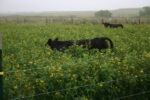
Grazing Cover Crops in Cropland
For some producers with extensive experience using cover crops, grazing can be a ‘next step’ in obtaining additional economic value while achieving environmental stewardship.
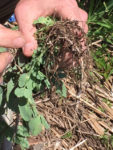
Soil Biology: Cover Crops and Disease Suppression
Cover crops provide several benefits to soil health such as improving soil structure, reducing the need for synthetic chemicals by decreasing weed biomass, increasing soil organic matter, contributing nutrients to the soil, retaining soil moisture, and decreasing soil erosion. In addition, the integration of cover crops into crop production often leads to soils that are suppressive to plant diseases (i.e. have less potential for disease development).

Annual Cover Crops in Florida Vegetable Systems
Fact sheet series from the University of Florida IFAS Extension on integrating cover crops in vegetable production systems in Florida.